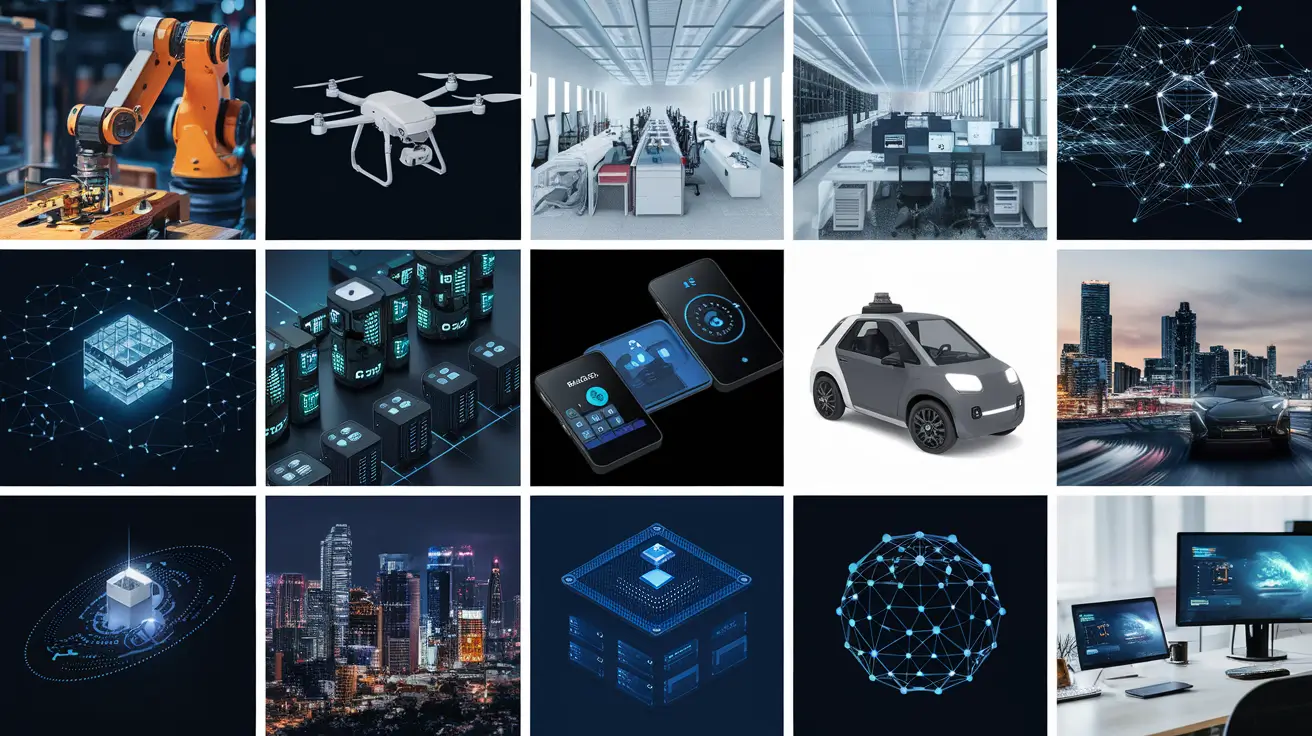The Intersection of Technology and Business in 2024: 14 Powerful Trends to Watch
As we advance further into 2024, the intersection of technology and business is creating unprecedented changes that are reshaping industries across the globe. The rapid evolution of technology has made it a critical driving force behind business innovation, operational efficiency, and customer engagement.
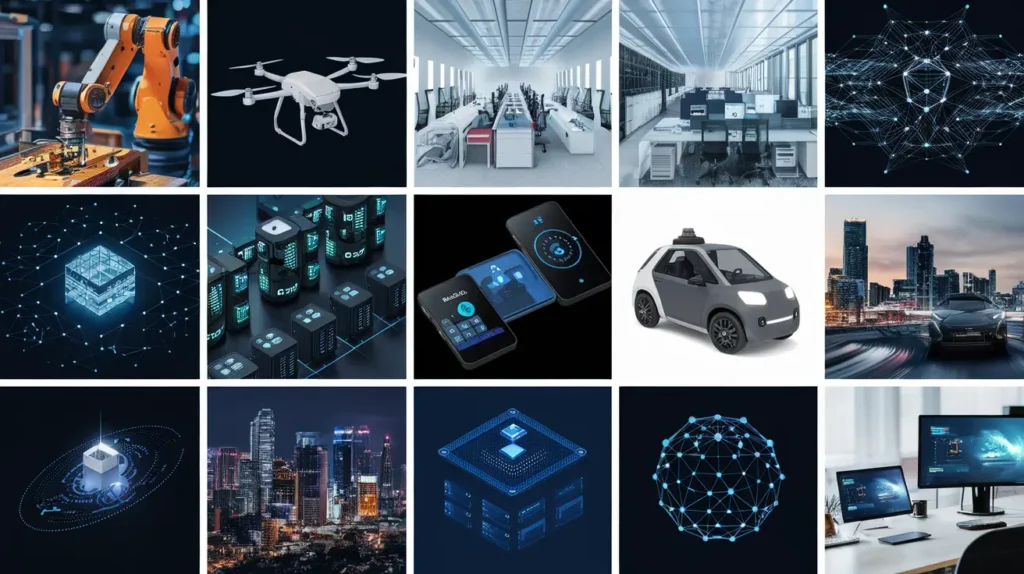
In this comprehensive guide, we explore seven powerful trends that every business leader should closely monitor this year.
Table of Contents
- 1. Artificial Intelligence (AI) Transforming Business Operations: The Intersection of Technology and Business
- 2. The Rise of 5G Connectivity and Its Impact on Business
- 3. The Growth of Blockchain in Business Transactions: The Intersection of Technology and Business
- 4. Data Privacy and Cybersecurity: The Intersection of Technology and Business
- 5. The Expansion of Remote and Hybrid Work Models
- 6. The Role of Sustainability in Business Practices
- 7. The Importance of Data-Driven Decision Making
- 8. The Rise of the Metaverse in Business
- 9. The Increasing Adoption of Edge Computing
- 10. Automation and Robotics in the Workforce
- 11. Augmented Reality (AR) in Retail and Marketing
- 12. The Emergence of Quantum Computing
- 13. Personalized Marketing and Hyper-Personalization
- 14. The Shift Towards Subscription-Based Business Models
- Conclusion
- FAQs: The Intersection of Technology and Business in 2024
- 1. What are the key technology trends affecting businesses in 2024?
- 2. How is Artificial Intelligence (AI) transforming businesses?
- 3. What is the impact of 5G technology on industries?
- 4. How can blockchain technology benefit businesses?
- 5. Why is cybersecurity critical for businesses in 2024?
- 6. What is edge computing, and why is it important for businesses?
- 7. How is the metaverse impacting business?
- 8. How can businesses adopt sustainable practices in 2024?
- 9. What role does data-driven decision-making play in modern businesses?
- 10. How will automation and robotics change the workforce?
1. Artificial Intelligence (AI) Transforming Business Operations: The Intersection of Technology and Business
The application of Artificial Intelligence (AI) is no longer just a buzzword; it has become a fundamental aspect of business operations. Companies are leveraging AI to automate routine tasks, optimize decision-making, and improve customer experiences.
AI-driven tools such as chatbots, predictive analytics, and natural language processing are revolutionizing customer service, allowing businesses to deliver personalized experiences at scale. Moreover, AI-powered algorithms are enabling more accurate demand forecasting, inventory management, and pricing strategies.

These developments are particularly evident in industries such as retail, finance, and healthcare. The integration of AI is also making business processes more efficient by reducing human error, increasing productivity, and lowering operational costs.
2. The Rise of 5G Connectivity and Its Impact on Business
The rollout of 5G networks is set to be a game-changer for businesses. With its ultra-fast data speeds and low latency, 5G is enabling new opportunities for real-time communication and data exchange.
This high-speed connectivity is critical for businesses that rely on Internet of Things (IoT) devices, as it allows for seamless data transfer between connected systems.

Industries such as manufacturing, transportation, and healthcare are poised to benefit the most from 5G technology. In manufacturing, for instance, 5G enables smart factories where automated machinery can communicate in real-time to optimize production lines.
In healthcare, it supports remote surgeries and telemedicine, allowing doctors to perform procedures from distant locations. The possibilities for business innovation with 5G are limitless, and its impact is expected to grow exponentially in 2024 and beyond.
3. The Growth of Blockchain in Business Transactions: The Intersection of Technology and Business
Once associated primarily with cryptocurrencies, blockchain technology is now being recognized for its potential to transform various business processes. Blockchain offers a decentralized and transparent way to conduct transactions, which is particularly valuable for industries that require high levels of security, such as finance, supply chain management, and real estate.
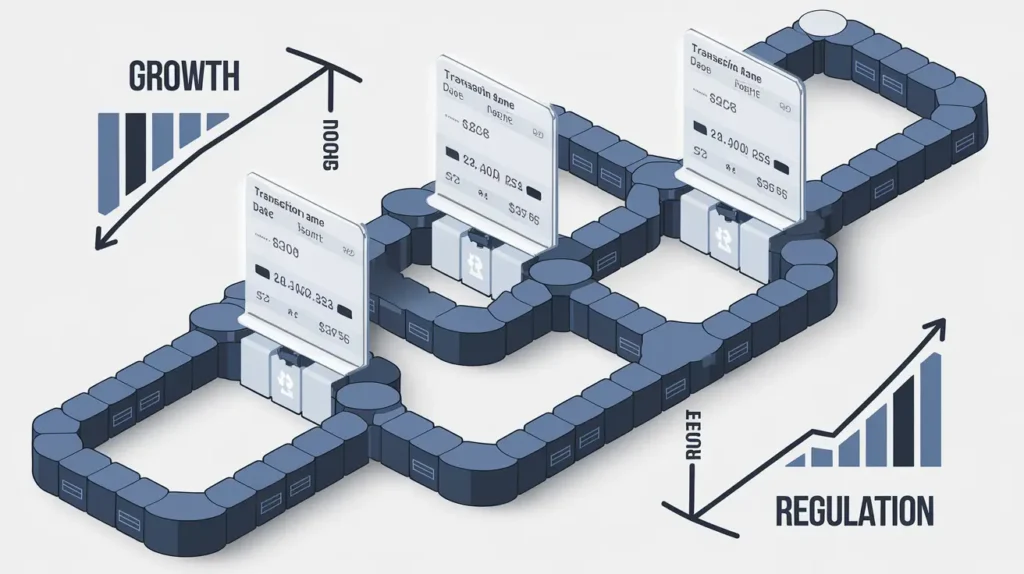
Blockchain enables smart contracts, which automatically execute actions when predetermined conditions are met. This reduces the need for intermediaries and significantly lowers transaction costs.
Furthermore, blockchain’s immutable ledger ensures data integrity, making it ideal for audit trails and enhancing trust between business partners. As blockchain continues to evolve, more businesses will adopt it to improve their security and operational efficiency.
4. Data Privacy and Cybersecurity: The Intersection of Technology and Business
In 2024, the increasing reliance on digital technologies has elevated the importance of data privacy and cybersecurity. As more businesses adopt cloud computing, IoT, and AI, the volume of sensitive data being generated and stored has surged.
This has made organizations more vulnerable to cyberattacks, data breaches, and ransomware.
Governments and regulatory bodies worldwide are enforcing stricter data privacy laws, such as the General Data Protection Regulation (GDPR) in Europe and the California Consumer Privacy Act (CCPA) in the United States. Businesses must now ensure compliance with these regulations to avoid hefty fines and reputational damage.
Cybersecurity solutions such as advanced encryption, multi-factor authentication, and behavioral analytics are crucial for safeguarding business operations. Companies that prioritize cybersecurity and invest in robust protection measures will have a competitive edge in the marketplace.
5. The Expansion of Remote and Hybrid Work Models
The remote and hybrid work models, which gained momentum during the pandemic, are here to stay. Businesses are increasingly adopting flexible work arrangements, recognizing the benefits of remote work in terms of employee satisfaction, productivity, and reduced operational costs.
In 2024, hybrid work environments—where employees split their time between the office and remote locations—are becoming the norm.
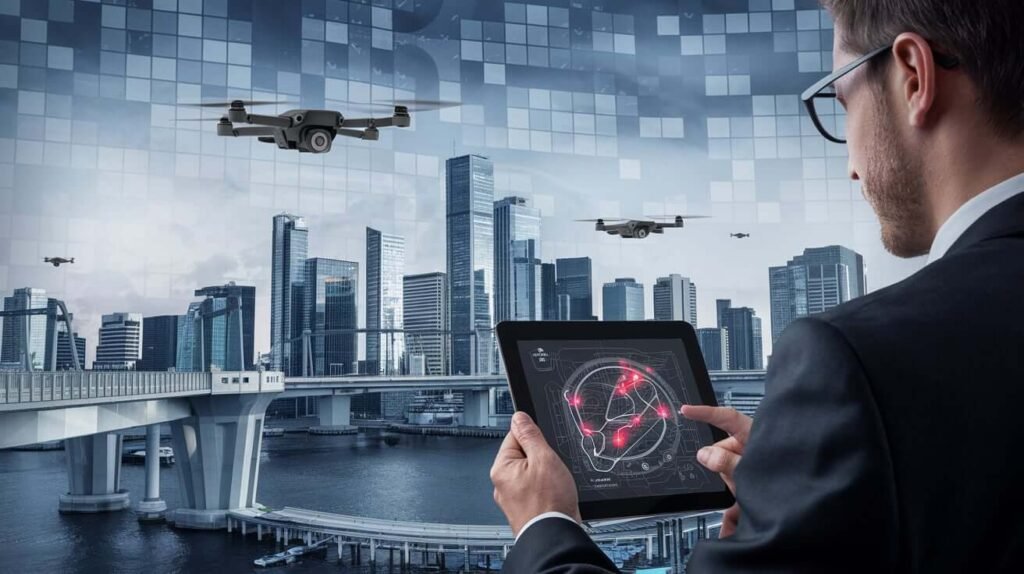
However, this shift requires businesses to invest in digital collaboration tools and secure remote access systems. Platforms like Microsoft Teams, Zoom, and Slack are playing a crucial role in keeping teams connected, while cloud-based project management tools ensure smooth workflow management.
As the demand for remote work continues, businesses must adapt their infrastructure and workplace policies to accommodate this evolving trend.
6. The Role of Sustainability in Business Practices
As environmental concerns grow, businesses are increasingly focusing on sustainability and corporate social responsibility (CSR). In 2024, consumers are placing greater importance on eco-friendly and socially responsible brands. Companies that fail to align with these values risk losing market share.
Sustainability initiatives are driving innovations in supply chains, product development, and marketing strategies. Businesses are implementing energy-efficient technologies, reducing waste, and adopting circular economy practices to minimize their environmental impact.

Additionally, investors are increasingly considering Environmental, Social, and Governance (ESG) factors when making financial decisions. By integrating sustainability into their core business strategies, companies can not only meet consumer demand but also gain a competitive advantage.
7. The Importance of Data-Driven Decision Making
In today’s data-rich environment, businesses are turning to data-driven decision making to gain insights into consumer behavior, market trends, and operational performance.
The use of big data analytics and machine learning algorithms allows companies to make informed decisions, optimize processes, and identify new revenue opportunities.

Businesses that leverage data effectively can gain a significant edge over their competitors. Data-driven decision-making helps organizations tailor marketing efforts, personalize customer experiences, and predict future trends with greater accuracy.
As more businesses adopt this approach in 2024, data management and analysis will become even more critical to driving success.
8. The Rise of the Metaverse in Business
The metaverse, a virtual reality space where users can interact with a computer-generated environment and other users, is making waves across various sectors.
Initially associated with gaming, the metaverse is now being embraced by businesses as a new frontier for marketing, collaboration, and e-commerce.
With companies like Facebook (now Meta), Microsoft, and other tech giants heavily investing in building metaverse platforms, it’s clear that this digital ecosystem holds significant potential.

In the metaverse, businesses can host virtual events, offer immersive shopping experiences, and even create virtual office spaces for remote teams to collaborate in a more engaging manner.
Brands like Nike and Gucci have already begun exploring how to sell virtual products in this space, opening up new streams of revenue. In 2024, we expect to see more businesses experimenting with the metaverse to engage with consumers in innovative ways.
9. The Increasing Adoption of Edge Computing
While cloud computing has been a dominant force over the past decade, edge computing is now gaining momentum. Edge computing allows data to be processed closer to the source of data generation rather than relying on a centralized cloud.
This is particularly important for IoT applications, where real-time data processing is essential.

For example, in industries such as manufacturing, healthcare, and telecommunications, edge computing can significantly reduce latency and enhance performance. By processing data locally, businesses can make faster decisions and improve operational efficiency.
As more businesses integrate IoT devices into their operations, the demand for edge computing will grow, making it a critical component of future business technology strategies.
10. Automation and Robotics in the Workforce
Another trend shaping the intersection of business and technology is the increased use of automation and robotics. In 2024, more industries are automating repetitive tasks and using robotics to enhance productivity.
From warehouse automation with robotic pickers to autonomous vehicles in logistics, businesses are turning to automation to reduce labor costs, improve accuracy, and speed up operations.
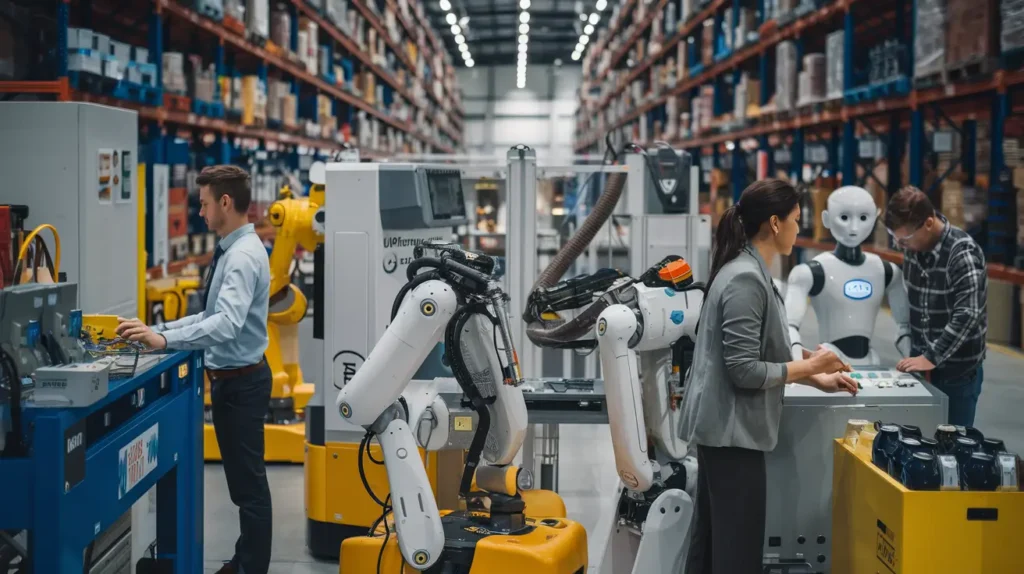
Robots are also playing a crucial role in manufacturing, where they are helping to streamline production processes and maintain high levels of quality control. In sectors like agriculture, robots are being used to assist with tasks such as planting and harvesting, which can help farmers optimize yield.
As businesses continue to focus on efficiency and innovation, the role of automation and robotics will only grow more prominent.
11. Augmented Reality (AR) in Retail and Marketing
Augmented Reality (AR) is rapidly transforming how consumers interact with brands, particularly in retail and marketing. AR overlays digital information onto the physical world, offering customers an enhanced shopping experience.
For instance, AR allows customers to virtually try on products such as clothes, glasses, or makeup before making a purchase, eliminating uncertainty and improving customer satisfaction.

Businesses are also using AR to create immersive marketing campaigns that allow consumers to engage with their products in new ways. For example, furniture companies are developing AR apps that enable customers to visualize how a piece of furniture will look in their home.
With consumer demand for personalized and interactive shopping experiences increasing, AR is becoming a valuable tool for businesses seeking to differentiate themselves in the marketplace.
12. The Emergence of Quantum Computing
While still in its early stages, quantum computing holds the potential to revolutionize industries that require complex data processing. Unlike traditional computers, which process data in bits (0s and 1s), quantum computers use quantum bits (qubits), allowing them to solve problems that would take classical computers years to calculate.
This is particularly useful for industries such as finance, where quantum computing can be applied to optimize trading strategies, risk analysis, and cryptography.

In the pharmaceutical industry, quantum computing could accelerate drug discovery by simulating molecular structures much more quickly than current methods. Although widespread adoption of quantum computing is still a few years away, businesses should start preparing for its disruptive impact as it continues to evolve.
13. Personalized Marketing and Hyper-Personalization
In the digital age, consumers expect personalized experiences tailored to their preferences. This is driving the rise of hyper-personalization, where businesses use advanced data analytics and AI to deliver highly targeted marketing messages.
By analyzing customer behavior, preferences, and buying patterns, businesses can craft content, product recommendations, and offers that resonate with individual consumers.
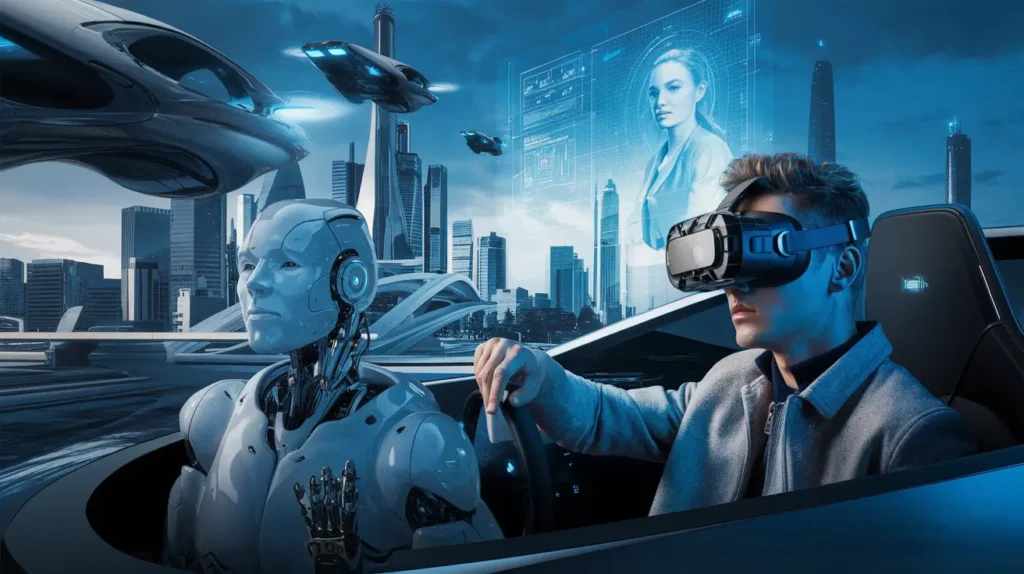
Personalization extends beyond just marketing emails; it is being integrated into website experiences, social media interactions, and product design. Brands that can successfully offer personalized experiences are more likely to build strong customer loyalty and increase their conversion rates.
In 2024, hyper-personalization will be a key differentiator for businesses looking to capture and retain their audience.
14. The Shift Towards Subscription-Based Business Models
Subscription-based models have gained significant traction in recent years, with businesses across various industries adopting this approach. From streaming services like Netflix to software providers like Adobe, subscription-based services offer recurring revenue and foster long-term customer relationships.
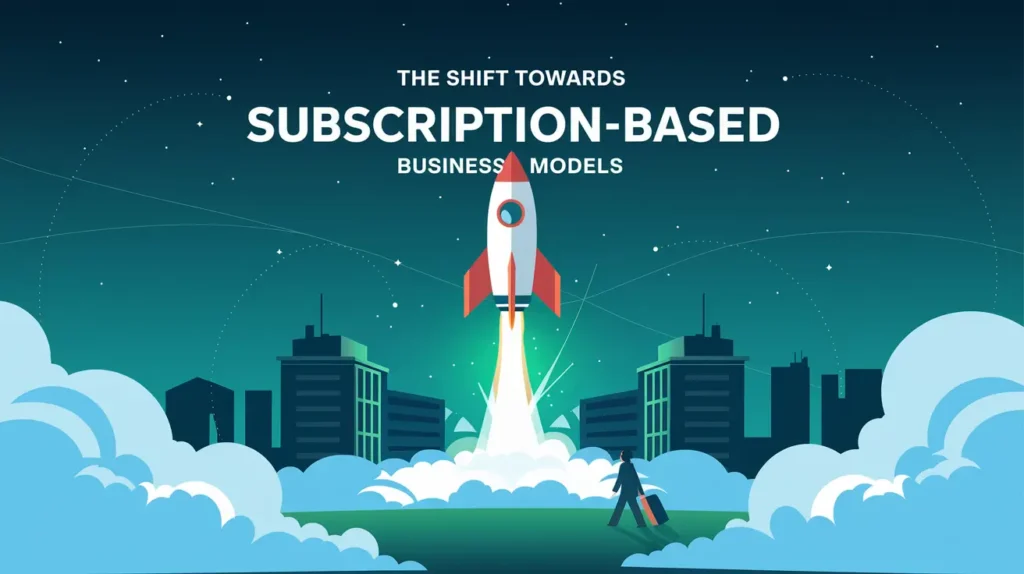
In 2024, we expect to see more businesses across industries shifting toward this model as it provides greater predictability in revenue and enhances customer retention. For businesses, the challenge will be in delivering continuous value to subscribers, ensuring that the service evolves to meet changing customer needs.
Whether it’s offering exclusive content, personalized services, or ongoing product updates, subscription models will continue to dominate.
Conclusion
The intersection of technology and business in 2024 is creating a transformative landscape where innovation drives growth and competitive advantage. From AI and blockchain to edge computing and the metaverse, businesses must remain agile and forward-thinking to stay relevant in this rapidly evolving environment.
By embracing these emerging technologies and aligning their strategies with current trends, businesses can not only survive but thrive in the years to come.
FAQs: The Intersection of Technology and Business in 2024
1. What are the key technology trends affecting businesses in 2024?
The key technology trends affecting businesses in 2024 include:
Artificial Intelligence (AI): Automating processes and improving decision-making.
5G Connectivity: Enabling faster data transfer and supporting IoT devices.
Blockchain: Securing transactions and improving transparency.
Edge Computing: Enhancing data processing speeds by decentralizing data storage.
Automation and Robotics: Streamlining workflows and reducing labor costs.
Augmented Reality (AR): Enhancing customer experiences in retail and marketing.
Quantum Computing: Offering potential breakthroughs in complex problem-solving.
2. How is Artificial Intelligence (AI) transforming businesses?
AI is revolutionizing businesses by automating routine tasks, improving customer service through chatbots, optimizing supply chains, and enabling data-driven decision-making. AI-powered tools allow companies to deliver personalized experiences, forecast demand, and reduce operational costs through advanced analytics and automation.
3. What is the impact of 5G technology on industries?
The rollout of 5G networks is having a profound impact on industries such as manufacturing, healthcare, and logistics by enabling real-time communication, faster data transfer, and smart IoT systems. 5G supports the development of smart factories and remote healthcare, allowing businesses to innovate and enhance operational efficiency.
4. How can blockchain technology benefit businesses?
Blockchain offers numerous benefits to businesses, including:
- Enhanced security for transactions through a decentralized ledger.
- The ability to implement smart contracts that automate transactions.
- Reduced costs by eliminating intermediaries.
- Improved trust and transparency in supply chain management.
5. Why is cybersecurity critical for businesses in 2024?
As businesses increasingly rely on digital platforms and store vast amounts of data, cybersecurity is more important than ever. Data breaches, ransomware attacks, and other forms of cybercrime pose serious risks to businesses. Prioritizing cybersecurity through data encryption, firewalls, and multi-factor authentication helps companies protect sensitive information and comply with data privacy regulations like GDPR and CCPA.
6. What is edge computing, and why is it important for businesses?
Edge computing involves processing data closer to its source, rather than relying on cloud computing. This reduces latency and improves real-time decision-making, which is critical for industries like manufacturing, telecommunications, and transportation that rely on IoT devices. Edge computing allows businesses to process data faster, reducing delays and optimizing their operations.
7. How is the metaverse impacting business?
The metaverse is opening new opportunities for businesses, particularly in marketing, e-commerce, and remote collaboration. Companies can host virtual events, offer immersive shopping experiences, and create digital spaces where employees can interact. As more consumers and businesses engage with the metaverse, it offers new ways to generate revenue and strengthen brand engagement.
8. How can businesses adopt sustainable practices in 2024?
Businesses can embrace sustainability by:
- Reducing energy consumption through energy-efficient technologies.
- Implementing recycling and waste-reduction programs.
- Adopting eco-friendly supply chain practices.
- Investing in renewable energy sources and supporting corporate social responsibility (CSR) initiatives.
- Sustainability efforts not only improve a company’s environmental impact but also appeal to environmentally-conscious consumers.
9. What role does data-driven decision-making play in modern businesses?
Data-driven decision-making allows businesses to leverage big data and advanced analytics to make informed choices. By analyzing customer behavior, sales patterns, and market trends, businesses can optimize operations, create targeted marketing campaigns, and develop products that meet consumer needs. This approach leads to better decision-making and improved overall performance.
10. How will automation and robotics change the workforce?
Automation and robotics are set to change the workforce by taking over repetitive tasks, such as data entry, assembly line work, and inventory management. While automation may reduce certain job roles, it also creates new opportunities in fields such as robotics management, maintenance, and AI development. For businesses, the use of robotics increases efficiency, reduces costs, and improves accuracy in production.

